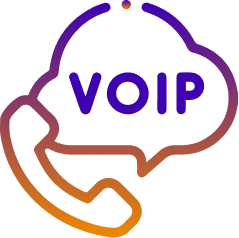When a business understands a need to get VoIP service for business purposes, there is only one question to deal with – how to choose the best business VoIP providers if taking into account the competition on the market, variety of offerings, and endless lists of features and pricing plans available. The VoIP service provider is the party that is totally responsible for the quality of communication services you will provide to your customers, so the quality of customer service, telemarketing campaigns, and lead management will also depend on the quality of service provided by the VoIP service provider. So, to select VoIP provider effectively, you have to read this VoIP buyers guide.
Thus, we decided to write a comprehensive guide to help you learn all about deciding the VoIP service provider and avoid any problems with it. Our goal is to make sure that your choice will match your needs and expectations, as well as customer expectations of your brand’s consumers.
Anyhow, let’s begin this guide to VoIP.
What is a VoIP service provider?
First of all, let’s deal with the definitions you need to know regarding the VoIP service provider for business purposes. A VoIP service provider is an organization that provides VoIP telephony services to its customers, almost always in the B2B industry as personal use of business VoIP services is limited and hardly can be taken into consideration as an important segment of this industry.
Nevertheless, not all people are familiar with the meaning of what is VoIP itself. VoIP (Voice Over Internet Protocol) is synonymous term with the term IP telephony, which means it is a telecommunications technology that allows to use of common telephony features, such as dialing, call transferring, and call holding, using the Internet connection without any traditional telephony landlines involved. In short, it is the technology that allows you to call through the Internet, and each time you do so by using FaceTime or WhatsApp, you use the standard IP telephony feature, and possibly, this call is processed via VoIP.
Nonetheless, if we need to go deeper into the methodology issues, the term Voice Over Internet Protocol doesn’t relate to voice communications only – you can transmit any data using VoIP technology, including media, voice messages, and video. The term VoIP is broader than IP telephony as IP telephony relates to phone calls (and voicemails) only.
So, the VoIP service provider is a commercial organization that provides VoIP services to other organizations and set up and maintains all needed protocols and software to keep VoIP services running. But the VoIP service provider doesn’t provide VoIP services alone, as you need a specific tool to use those services, don’t you? Such a tool can be any business software with IP telephony integration – either it is a cloud PBX system or cloud-based call center software, or even CRM system with IP telephony native integration.
Based on that, you are not only choosing a VoIP service provider, but a product that offers all the business VoIP services you need – that’s why you need this VoIP buyers guide .
VoIP provider buyers guide: checklist
First of all, before making a final choice, you have to avoid hurrying up and making impulsive decisions. A VoIP service provider for business can cost you a lot of money, and not every company is ready to pay more for signing monthly contracts instead of annual agreements, as well as the contract prerequisites can include a fine for you or other sanctions if you ever want to terminate the contract. So, making a bad choice of VoIP service provider for your company will not only cost you a lot of time but also a lot of money. There is a good saying for such occasions – measure seven times, but cut once.
Questions you need to ask yourself
So, first of all, you have to write down a shortlist of features you need your VoIP service provider to provide you with. It is not a secret that the term “VoIP services for business” covers numerous features, from basic ones like call recording or call transferring to advanced, ones like multichannel communication or video conferencing. You have to measure and evaluate the following characteristics of your business: how many customers are you going to service daily and monthly? What’s the expected growth of the company’s customer base? Are you going to use any outbound calling techniques, whether for telemarketing purposes or for lead generation? How many employees are you going to hire for your call center department? What are your requirements for business continuity? Are you going to trust a hosted VoIP provider or do you need an on-premise solution? What’s your setup and scale-up budget for this year?
Answers to these questions are a checkpoint where it all begins. Suppose you are a small business or midsize company with limited resources, but also without a need to service hundreds of customers on a daily basis. In that case, you can start with a basic package of features and save some money for the future, when you will really need scalability and advanced capabilities.
Internet connection and equipment
Another important question is the current speed and capacity of your Internet connection. If your provider can’t provide the required speed of the web connection which is needed to run advanced VoIP service for business, you need to choose: whether to change provider or pick up a simpler VoIP solution.
You also need to understand that setting up a VoIP solution for your business means you have to allocate a budget for equipment and set up workplaces for agents who will service customers and work with the VoIP solution. This budget isn’t as high as it can seem, but at least headphones and monitors for agents can cost some money, and this means you will have to save that money by paying less for the business VoIP providers’ services.
Hidden fees
Now let’s move to the less pleasant, but not the least important part of this paragraph – pitfalls that await you on your path to getting your VoIP business providers as your partners. First of all, it isn’t a rare occasion when a VoIP service provider hides some fees from you, and you acknowledge that only when the contract is signed. It relates to many aspects of business VoIP system functioning, including limits of data storage, hidden setup fees, and other limitations that aren’t directly mentioned in the advertising materials and can be found only somewhere in the middle of the agreement. What to do, if you notice hidden fees in business VoIP service provider’s terms and conditions of use? First of all, you have to understand if those limitations aren’t too high for your current needs. In most cases, it works in the following ways: most limitations are hidden in basic subscription plans, especially in the cheapest ones. If you understand that you can’t exceed those limits just because you don’t process as much data as it is limited, you can purchase such a plan and upgrade it when you need a scalability option. If such limits are much harder than they are in the case of competitors, you would better look for another option – such policies often cause issues and conflicts between a business VoIP service provider and user of services, and that’s the last thing you would ever need.
VoIP providers comparison
So, here we are at the last stage of this checklist – and to finish it properly, let’s say the most important thing concerning choosing a VoIP Service Provider and business VoIP system: you have to compare VoIP providers, and VoIP comparisons have to cover all aspects of the cooperation: terms of use, service level agreements, business continuity issues, scalability, vendor’s readiness to update the business VoIP system to meet your individual needs, the flexibility of vendor’s authorities, customer support policy, pricing, payment options, and so on. In most cases, people end with comparison at the stage “I`ve compared offered features, they’re the same” – and here is the biggest mistake you can ever make. Also, always check real users’ reviews on trustworthy resources, like Capterra, to make sure that there were no bad cases with these solutions or providers at all, or at least these bad cases were single-case occasions.
Features
And now let’s move on to the most popular question regarding choosing a VoIP service provider, no matter whether it is a small business VoIP service or a large enterprise VoIP solution – all of them use the same features, or would like to use the same features.
There are basic and advanced features of VoIP services, and there is no generally accepted classification that would group those features, so we have to rely on our expertise and experiences in this case.
Basic VoIP features are more about technical information and protocols which make the system work properly – this includes SIP trunking, DID services, toll-free phone numbers, call transferring, call routing, call holds, and outbound calling.
Advanced VoIP features include video conferencing, mutli and omnichannel communication, third-party software integrations via API (Application Programming Interface), multi-level IVR system, chatbot integrations, advanced reporting, remote agents workforce management, call scripting, call monitoring, call logging, call blending and so on.
VoIP provider buyers guide: What do you get if you choose a proper VoIP service provider?
Even though you can feel a bit stressed after reading the previous part of this article, we are going to talk about more pleasant things now. Yes, choosing a VoIP service provider is a difficult and responsible task, and even negotiations between you and the provider may take a few months, but it doesn’t matter if compared to the opportunities you get after setting up your VoIP business system.
Perfect customer experience
With a properly configured VoIP business system, no matter if is it cloud PBX or contact center software, your customers will get timely and professional service wherever they are. No long on-hold times, no lengthy call queues – a few seconds of waiting and they are connected to a proper agent who is chosen by the system based on numerous factors automatically. Suppose you pay a bit more and purchase call center software. In that case, you can also provide customer service through all communication channels – web chats, social media, emails, and messengers from a single interface, which boosts customer satisfaction and customer retention, too.
Improved sales performance
Intelligent algorithms and numerous features allow you to collect customer data from different channels and store it in the built-in CRM software which is totally integrated with your VoIP business solution. This data can be used to provide personalized service and for cross-sales and up-sales, which are much more effective than if you use them without any understanding of customer persona and their individual needs.
Moreover, powerful outbound calling features, like Predictive dialer, can boost the productivity of your cold calling campaigns by 300% and conversion rates by 2,5 times higher than it is without using such features!
Easy scalability
Your business grows permanently, and it is very important to get a solution that will grow with your business simultaneously. Fortunately, there are such solutions available on the market of VoIP business services – as cloud VoIP solutions don’t require any hardware to be all set and keep running, you don’t need any effort to put to scale them up! You just need to ask the vendor to include new features (those that are available, surely) into your subscription plan and scale up the number of accounts for new employees – and you’re all set!
Data-driven performance
VoIP solutions provide you with advanced reporting and data analytics capabilities, which means you receive all data, including vital performance metrics and KPIs (Key Performance Indicators) on real-time dashboards on a daily basis, which helps to make thoughtful decisions and changes in your business strategies without any harm to your business. VoIP solutions not only provide communications, they help you learn all about your communications with customers and about customers themselves, which means you will always be able to move forward with a clear understanding of your further steps and potential issues which may await you in the future.
Conclusion
As you can see from this guide to VoIP, choosing a VoIP service provider is a challenging, but worthwhile task that can determine the success of your business in the future. VoIP systems are different – it can be a cloud PBX system or call center solution, or any tool with IP telephony integration – but the case is always the same: you have to check all information about the vendor, understand your current and future needs and requirements, learn what equipment you need and choose an appropriate option that will have positive reviews, affordable pricing, as little hidden fees as possible, and finally, all needed features you have. We offer a listing of really well-known and trusted providers, so you can take a look at the best options on the market which have been already reviewed by our team of real property professionals in the VoIP industry to avoid unnecessary advertising. Choose only the best for your business!





